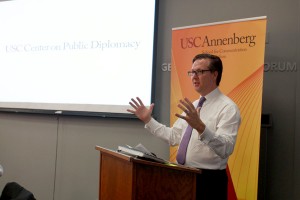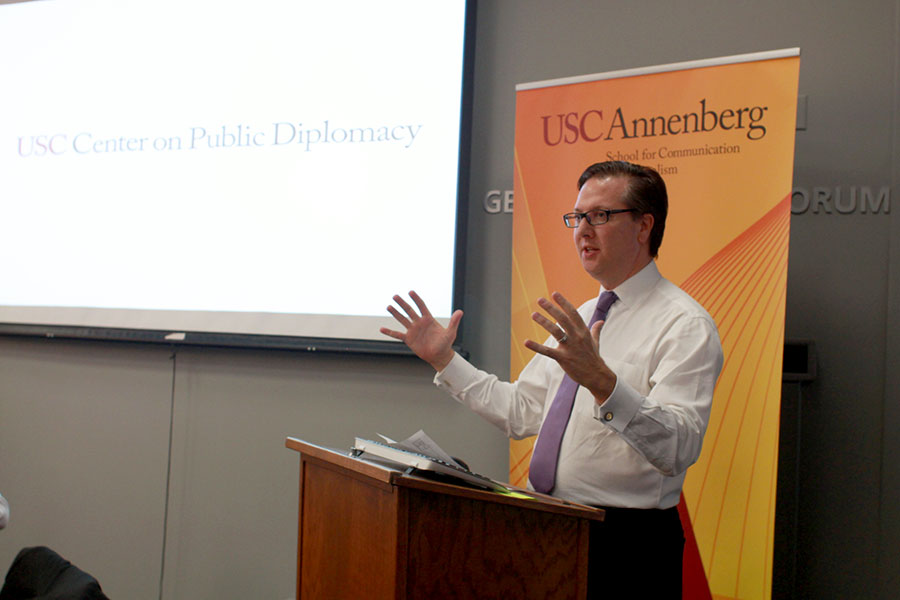US Ambassadors discuss diplomacy in East Asia
The USC Center on Public Diplomacy held a Conversation in Public Policy event with U.S. ambassadors to several Asian countries at the Annenberg School for Communication and Journalism on Tuesday afternoon.

Down to business · Alexander Feldman, above, President and Chief Executive Officer of the US-ASEAN Business Council, speaks on campus. Tuesday. – Christine Yoo | Daily Trojan
The panel was composed of the United States ambassadors to Indonesia, Cambodia, Singapore and Malaysia, as well as the president and CEO of the US-ASEAN Business Council, Alexander Feldman. Professor Gabriel Kahn, co-director of the Media, Economics and Entrepreneurship program at Annenberg, mediated the conversation.
ASEAN, or the Association of Southeast Asian Nations, is a political and economic organization made up of 10 countries that have seen years of economic growth. Over the last few years, increased trading with countries that are part of ASEAN has had a positive effect on the American economy and California’s economy in particular.
The conversation revolved around trade and economics. To open the discussion, Feldman asked the ambassadors if they ever felt it was part of the challenge to overcome the dominance that the China-U.S. trade and economic relationship poses in order to develop a true economic policy geared toward ASEAN.
“The United States invests $200 billion in ASEAN and $158 billion of that runs through Singapore,” said Kirk Wagar, U.S. Ambassador to the Republic of Singapore.
The ambassadors said that they had different economic and diplomatic focuses.
Robert O. Blake Jr., U.S. Ambassador to Indonesia, mentioned the importance of utilizing social networking in nations which do business with the United States. He explained that because Indonesia’s population is largely juvenile, he and his team took part in creating a 21st-century cultural center in Jakarta. The center, named @america, invites young Indonesians to explore and discuss ideas about the United States. These kinds of projects familiarize Indonesians with the United States.
Kimiya Shokoohi, a recent Annenberg graduate, attended the conversation because of her interest in America’s influence in public policy abroad.
“I didn’t realize the magnitude and presence of the U.S. in ASEAN,” she said. “There is a great potential for increased trade in all of Asia.”
Some of the ambassadors stressed the importance of using public diplomacy to help American companies in foreign countries, as well as express humanitarian values. Blake described how in late September a province in Sumatra enacted into law a bill that implements a stricter version of Islamic Sharia law in the town’s criminal law. The law would allow for corporal punishment against homosexual sex on both Muslims and non-Muslims. The embassy’s response was to release a tweet reflecting that in their opinion it was an unfortunate decision.
Blake further explained that American responses like these affect Indonesian business decisions.
“It’s also important for [Indonesian businesses] to know that if they are trying to attract American investment and if they’re trying to attract American tourism, these kinds of things are not going to attract those objectives,” he said.
William Todd, U.S. Ambassador to the Kingdom of Cambodia, concluded the conversation by encouraging the students in attendance to consider a career in foreign service. He explained that one thing all of the ambassadors present had in common was strong enthusiasm for their jobs.
Mary Phung, a senior majoring in international relations, came to the event due to her interest in foreign service and ASEAN.
“I have been interested in joining the foreign service. It was great to find out what kinds of activities our ambassadors impart in,” Phung said.

